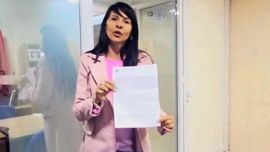Government officials have moved to defend President Alberto Fernández after he announced adjustments to pensions on Friday a move that sparked support and criticism.
All pensions will be increased by 2.3 percent this quarter plus a fixed sum of 1,500 pesos, President Fernández announced Friday close to press time, the first in a host of economic measures that have been rolled out in recent days.
The move represents a 13 percent increase for minimum pensions (which around half of pensioners currently receive) and AUH family benefits, covering a total of 11.8 million persons. For the rest of the retirees the increase will be smaller.
Fernández also unveiled a list of 170 medical remedies which will be free for pensioners.
The announcements follows the temporary suspension of the pension updating system implemented by the previous government led by Mauricio Macri, which linked payments to inflation via "indexing."
"We have fulfilled our duty to improve the situation of the most disadvantaged and vulnerable," proclaimed Fernández, 60, on Friday at a press conference.
ANSES social security administration chief Alejandro Vanoli said that 86.8 percent of pensioners would be receiving a superior sum to the previous system, thanks to a 5,000-peso bonus granted earlier this year.
Meanwhile, confirming news that emerged over the weekend, the government issued an emergency DNU decree on Monday ordering that so-called "double severance" for lay-offs would not be applied to public-sector workers.
In December, the government announced that for the first 180 days of its administration, employees would receive double redundancy pay in order to halt terminations. The benefit, due to last until June this year, will now only apply to private-sector workers.
Labour Minister Claudio Moroni, speaking Monday, said that double severance would not be extended past June, saying there were "no vocation to extend it."
The government also on Friday presented a bill before Congress to modify the formula that calculates pensions for diplomats, judges and members of the Judiciary. The legislation would dramatically shift potential income post-retirement for judges, who at present receive 82 percent of their final annual salary upon taking retirement, altering it to 82 percent of their average pay-cheque of the last 10 years, according to Noticias Argentinas.
Last Friday, the Fernández government also announced a plan to provide 170 medicines free of charge to retirees, among those substances recommended by the World Health Organisation (WHO).
"These expenditures will be made from the income of the PAIS tax," the president said, recalling his first government measure, a 30 percent tax on limited foreign currency purchases and foreign tourism expenditure, among other dollarised activities.
With no funds to meet pending debt payments, the Peronist leader last week postponed the capital payment of a bond for some US$1.5 billion, while he renegotiates Argentina's heavy debt burden, which is close to 90 percent of the gross domestic product.
"We postponed a payment of a dollarised bond and we are going to continue to serve first those who have less before the speculators," Fernández said at his press conference.
'Violation'
Moroni was forced to defend the government's pensions measure over the weekend, describing it as "clearly not an adjustment."
"People forget that the country is in an emergency. We have found the country in an unfortunate situation, with problems of financial resources. All the indicators are wrong,” he said.
Argentina's annual inflation rate is around 53 percent, while close to 40 percent of the nation's 44-million strong population is living in poverty, according to data from the Catholic University of Argentina (UCA).
However, Moroni did acknowledge that the government would face " probably many claims" in the courts over its decision.
The National Defender for the Elderly, Eduardo Semino, said he would launch a collective action this week to challenge the move, saying it "violates acquired rights" and is motivated by an intention to "pay less to retirees.”
The measure could trigger another wave of lawsuits against the State, according to specialists and opposition leaders.
Semino, anticipating his appeal to the courts, says the change in the calculation used to determine pentions is "in violation of the law.”
Around 2.5 million retirees and pensioners would be in a position to initiate lawsuits, according to estimates circulated by opposition Juntos por el Cambio lawmakers which estimates that half of those receiving benefits are being affected by the measure.
– TIMES/AFP/NA/PERFIL


























Comments